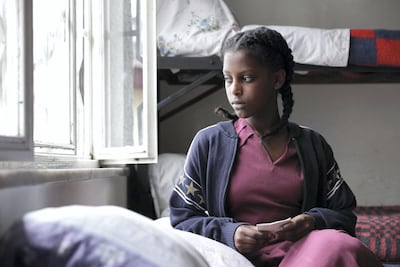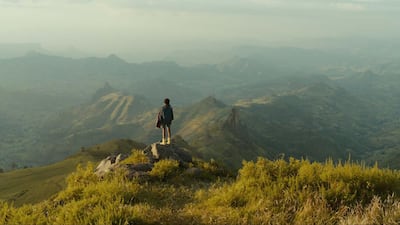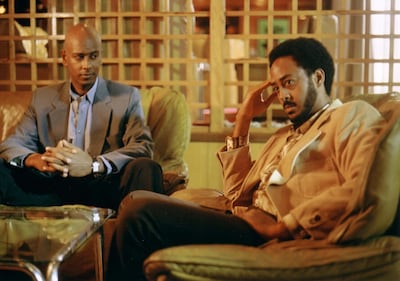One way to understand a country is through its films, and UAE audiences will have the chance to do just that at Imaging Ethiopia in Sharjah. Featuring eight movies, the festival is part of a larger programme launched by the Africa Institute last week – its scholarly and cultural season, which delves into the history and culture of a specific African country through lectures, art, music, film and theatre. This year, that country is Ethiopia.
Screenings, which are all free and open to the public, begin on Saturday, October 26, and are scheduled to be shown at Sharjah’s Africa Hall until May 2020.
“We tried to balance films that are being produced within Ethiopia and by diaspora filmmakers,” says Dagmawi Woubshet, an author and professor at the University of Pennsylvania who led the selection of the titles for the festival.
Woubshet is one of three scholars commissioned to develop the season’s programme, themed Ethiopia: Modern Art / Ancient Roots, which will include symposia in Sharjah and Addis Ababa, a theatrical play and an art exhibition by Aida Muluneh.
Through Imaging Ethiopia, audiences will get a glimpse of Ethiopian culture and political life, and learn that the country's contemporary issues – rapid globalisation, post-conflict trauma and the complexities of diaspora – ring true for many nations on the continent. "You will see how the significance of the 1974 Revolution affected many things, including the films," Woubshet says.
Ethiopia, often touted as the "cradle of civilisation", has a rich history that stretches back millennia. Since antiquity, the country had been ruled by nobility, until a Marxist revolution in 1974 deposed Emperor Haile Selassie and placed power in the hands of a Soviet-backed military junta, the Derg.
During Selassie's reign, cinema houses such as Empire and Ambassador existed despite heavy censorship. Under the Derg, led by the dictator Mengistu Haile Mariam, cultural production ground to a halt as the country was thrown into a 17-year civil war and witnessed anti-military uprisings, separatist movements and famine that led to the deaths of more than a million people.
It is against this backdrop that Teza, the first film in the festival line-up, unfolds. Directed by renowned filmmaker Haile Gerima, it follows the homecoming of Anberber, an intellectual who spent years in Germany for study. Now back in a conflict-ridden Ethiopia, he realises his powerlessness amid the forces of the new government and the rebels that compete for allegiances.
The film won the Special Jury Prize and Best Screenplay at the 2008 Venice Film Festival. A more personal look at the war can be seen in the documentary Ye Wonz Maibel: Deluge by Salem Mekuria. Released in 1997, only six years after the war ended, it meditates on conflict and reconciliation through the lens of a family tragedy: Mekuria lost her brother and best friend during the dictatorship.
Imaging Ethiopia also includes films that focus on the interior lives of Ethiopians. "We are trying to balance films that have an explicit political message, but also some that are preoccupied with this everyday, quotidian Ethiopian life where politics isn't in the foreground," Woubshet says.
In the touching 2015 drama Lamb by Yared Zeleke, a young boy is sent by his father to live with distant relatives after the death of his mother. As the father sets off to find work in Addis Ababa, the boy and his pet sheep stay with an uncle, who wants to sacrifice the animal for a coming religious feast. Tensions build as the boy, Ephraim, would rather stay at home and cook than perform typical "masculine" tasks.
Lamb – the first Ethiopian film to be shown at the 2015 Cannes Film Festival – shows the sprawling natural beauty of Ethiopia's landscape, while painting an intimate portrait of a child challenging traditional gender norms. Filmmaker Aida Ashenafi considers village life from another perspective in Guzo, which recounts the experiences of two young Addis Ababa residents after spending 20 days in a small Ethiopian village. At the core of the film is the question of economic progress and its impact on communities.
"You see the dichotomy between urban Ethiopia and rural Ethiopia … This is an issue that is so germane to the continent, but we don't talk about it the way we should. It's a film that shows how that rural and urban divide, how that tension continues to inform contemporary Ethiopian life," Woubshet says.

The festival also includes Nesanet Teshager Abegaze's short film Bereka, which uses the Ethiopian coffee ceremony as a departure point to explore ideas of migration, and Difret, on which Angelina Jolie was executive producer, and which Zeresenay Berhane Mehari wrote and directed. Released in 2014, the film is based on the true story of a lawyer defending a 14-year-old girl who killed her rapist in a rural village.
In Imaging Ethiopia, the Africa Institute presents a rare opportunity to explore Ethiopian cinema. Woubshet has thoughtfully put together a line-up that demonstrates the depth of talent within the country and its diaspora.
Imaging Ethiopia runs from Saturday, October 26 to Friday, May 1, 2020. The full schedule of screenings can be found at www.theafricainstitute.org



